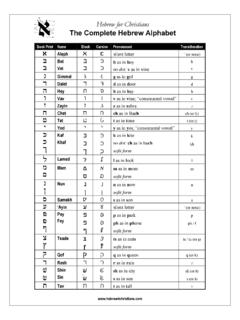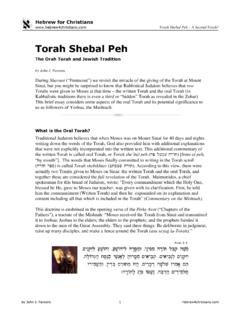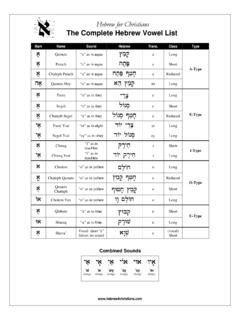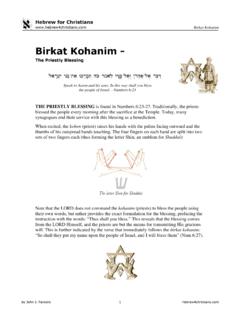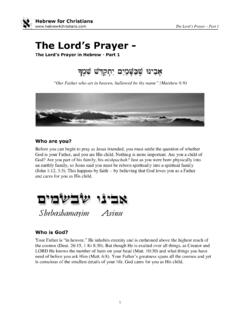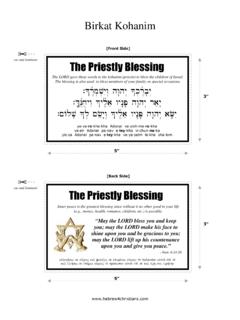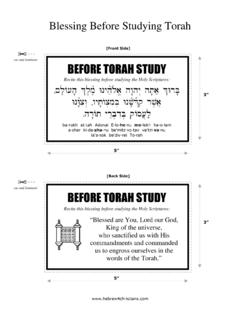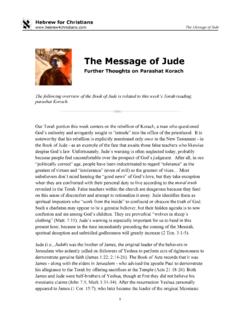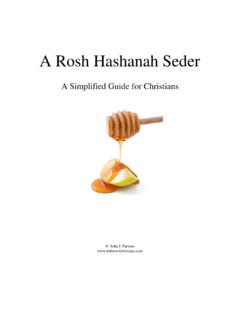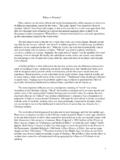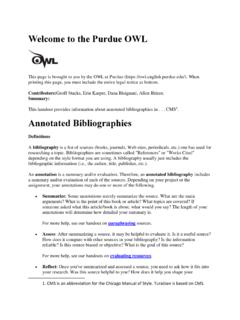Transcription of Yeshua our Sabbath Rest - hebrew4christians.com
1 Hebrew for Christians by John J. Parsons 1 Yeshua our Sabbath Yeshua our Sabbath Rest Trusting God for the Work of Salvation RECENTLY SOMEONE WROTE me to ask if it would be kosher if they took a vacation on the Sabbath day. This person was planning on a camping trip and wondered if hiking around and lighting a campfire would be prohibited in this In response let me summarize a few things that I ve written elsewhere on this site. First, we need to remember that the Sabbath day (and therefore the sanctification of time itself) is now under the authority of the Messiah (Matt. 12:8, 28:18, Rom. 14:5-6, Col. 2:16-17). In other words, to understand the meaning of the Sabbath , we must first of all look to Yeshua as our Teacher (John 13:13).
2 For example, Yeshua said all of the following works were permitted and even recommended - to be done on the Sabbath day: 1. Saving a life (Mark 3:4; Luke 6:9) 2. Healing others (Luke 6:1-10; Mark 3:1-5; John 5:9; 9:14; Luke 13:10-16) 3. Conducting brit milah (circumcision) (John 7:23) 4. Teaching (Mark 1:21; Luke 4:31; Acts 18:4) 5. Serving at the Temple (Matt. 12:5) 6. Rescuing an animal in distress (Matt. 12:11; Luke 14:1-6) 7. Showing acts of compassion (Matt. 12:1-4) 8. Caring for animals (Luke 13:15) 9. Carrying a bed (John 5:9-16) 10. Meeting the needs of others before fulfilling religious obligations (Mark 2:27-28) I have been crucified with the Messiah. It is no longer I who live, but the Messiah who lives in me.
3 And the life I now live in the flesh I live by faith in the Son of God, who loved me and gave himself for me. I do not nullify the grace of God, for if righteousness were through the Torah, then the Messiah died for no purpose. Gal. 2:20-21) Hebrew for Christians by John J. Parsons 2 Yeshua our Sabbath Some people claim that Yeshua s argument with the scribes and Pharisees had to do with their adherence to the Oral Law ( , putting a fence around the Torah ), and therefore Yeshua deliberately did things that contradicted their assumptions. While that may be true in some cases ( , ritual hand washing, associating with sinners, etc.), in other cases it s clear that much of what Yeshua taught agreed with the ethical teachings of the sages of His day ( Hillel on neighbor love, Shammai on divorce, the centrality of the Shema, etc.
4 , and therefore it s a mistake to say that he categorically rejected the traditions of the elders. After all, the moral truth of God is a constant, and all worthy ethical teachers end up saying much the same thing regarding personal and social ethics. Notice, however, that while the sages put a fence around the Torah in deference to the authority of Moses, Yeshua consistently went beyond the authority of Moses himself (who spoke in the Name of YHVH [hwhy]) by saying things like: You ve heard that it was said to the ancients (Hkou,sate o[ti evrre,qh toi/j avrcai,oij), but I say to (Matt. 5:21-43). Who is this man to overrule the very words of the Ten Commandments? Similarly Yeshua regularly forgave people of their sins (Mark 2:5-7; Luke 7:48-50, Matt.)]
5 9:5-7), claimed to be the Judge of the World (Matt. 16:27, 25:31-46; John 5:22), and demanded to be honored as the God of Israel Himself (John 5:23). His was the voice of Authority coming from a new mountain (Matt. 7:29, 17:1-3; Mark 1:22). Unlike the scribes and Pharisees of his day, Yeshua claimed equal authority with YHVH Himself (John 5:18, 5:23; 8:58, 10:30-33, 14:9; Mark 2:7, 13:26, Luke 5:21; Rev. 1:8, etc.). He was far more than a moral or religious teacher, of course, since He spoke as the Voice of the Living God speaking from the midst of the (Deut. 5:26, Matt. 17:1-3). As the Word of God - the Voice of YHVH - Yeshua is One with YHVH (John 10:30; 14:9). Just as the Voice of YHVH is YHVH, so the Spirit of YHVH is YHVH: Heaven and earth will pass away, but my words will not pass away (Mark 13:31).
6 His mission was not to reform Temple Judaism but to die for the sins of the world. Therefore we see him overthrowing the money changers tables at the Temple and literally stopping the Temple sacrifices from taking place (Mark 11:15-19). His body represented the true Temple of God (John 2:19). And regarding the sanctification of time, Yeshua stated He was the very Lord of the Sabbath (tB'V;h; !Ada]) a title that could only be rightly applied to the LORD God of Israel Himself. Recall that it was on the Sabbath that Yeshua said to the Pharisees, My Father is always at His work to this very day, and I, too, am working (evrga,zomai - from the word e;rgon, work ). For this reason the Jews tried all the harder to kill Him; not only was He breaking the Sabbath (e;luen to.)
7 Sa,bbaton), but He was even calling God His own Father, making himself equal with God (John 5:17-18). Later, some of the Pharisees said, This man is not from God, for He does not keep the Sabbath (ouvk e;stin ou-toj para. qeou/ o` a;nqrwpoj( o[ti to. sa,bbaton ouv threi) (John 9:16). Hebrew for Christians by John J. Parsons 3 Yeshua our Sabbath On another occasion, the Pharisees attempted to rebuke Yeshua because He allowed his disciples to pluck grain on the Sabbath (Matt. 12:1-7). Look! Your followers are violating the laws of Shabbat! Yeshua responded to his legalistic critics by reminding them that: 1) King David entered into the Holy Place of the Tabernacle and ate showbread - despite the law s clear prohibition of doing so, 2) the priests themselves were ordained by God to work on the Sabbath and yet were regarded as blameless, and [therefore] 3) since both King David and the priests acted this way, the Pharisees should have understood King Messiah s purpose for doing so as well.]
8 Indeed, Yeshua pointed out that His mission as the Redeemer of Israel transcended even the laws of the Temple itself (Matt. 12:6). Yeshua is the Righteous Branch (tzemach tzaddik, qyDIc; xm;c,), the great Davidic King who was promised to appear (Jer. 23:5-6). This Righteous Branch is also mentioned in Book of Zechariah as the one who would ultimately unite the authority of the priesthood with the Kingship of God on behalf of Israel s redemption: Behold, a man called the Branch (tzemach) shall branch out (xm' ) from the midst of the earth, and he shall build the Temple of the LORD (hw"hy> lk;yhe-ta, hn"b'W) [Zech. 6:12]. Likewise Yeshua is called Adonai Tzidkenu - the LORD our Righteousness, the Anointed One who would unite the roles of the King of Israel with that of Israel s great High Priest.
9 In light of God s redemptive work through the Messiah, therefore, the Scriptures command us to consider Yeshua , [who] has been counted worthy of more glory than Moses as much more glory as the builder of a house has more honor than the house itself (Heb. 3:1-6). Yeshua alone is our great Kohen Gadol (High Priest) of the better covenant (Heb. 8:6), and Yeshua alone is the Supreme Mediator between God and man. Only Yeshua brings God and man together. The Supremacy of the Messiah Consider, then, how Yeshua the Messiah is greater than: 1. The first Jew, Abraham (John 8:53-58) 2. Israel and his children (John 4:12-14) 3. Moses the lawgiver (Heb. 3:1-6; Matt. 17:1-8; John 1:17; Acts 13:38-39, etc.) 4. All the angels of God (Matt.)
10 13:41-42; Heb. 2) 5. The Levitical priesthood (Heb. 7; 13:10) 6. The Temple itself (Matt. 12:6, cp. Mark 11:16); 7. All the sacrifices offered at the Temple (Heb. 8-10) 8. King David, Israel s first great king (Matt. 22:41-46) 9. Solomon, the greatest king of Israel (Luke 11:31) Hebrew for Christians by John J. Parsons 4 Yeshua our Sabbath 10. Jonah, one of the greatest Jewish prophets (Matt. 12:41) 11. Elijah, one of the greatest Jewish prophets (Matt. 17:1-8) 12. The Sabbath (John 5:17-18; Matt. 12:8) Indeed, Yeshua is called the very Creator Himself (Col. 1:16-19, John 1:1,14, Heb. 1:3, 3:3-4) who sits upon the throne of God Himself (Psalm 45:6-7; Heb. 1:8). He is both the Judge and the Savior of the world (Matt.
